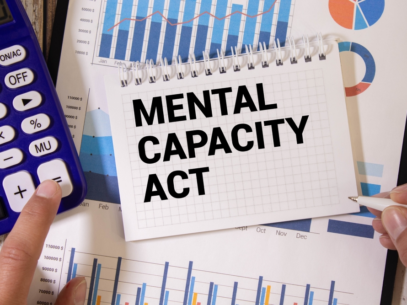13 April 2023
By Claire Webster, SCIE Practice Development Consultant
How do we ensure that people who are unable to make decisions about their care or accommodation arrangements aren’t arbitrarily removed of their Right to Liberty?
With the announcement of a further delay to the implementation of Liberty Protection Safeguards, or LPS, I want to reflect (as a previous MCA DoLS lead, and continued social justice and Human Rights advocate) on where this may leave people and health and social care authorities, currently experiencing and managing significant ‘backlogs’ for Deprivation of their Liberty authorisations.
Deprivation of Liberty Safeguards (DoLS) has long been criticised for being overly complicated and bureaucratic. The challenges being apparently compounded with the Supreme Court decision in the case of P v Cheshire West & Chester Council & another; (2) P & Q v Surrey County Council in 2014, which lead to the number of referrals increasing dramatically due to the revised criteria for people being identified as Deprived of their liberty.

While the perceived simplification of criteria may have been welcomed from a practice development perspective, it has been an ongoing challenge for authorities to meet the fast and ever-increasing demands through referrals for Deprivation of Liberty Authorisations.
LPS has pointed to an opportunity and acceptance of the position that authorities faced in meeting this demand, and looked at opportunities to streamline the current process, making this part of the assessment processes currently in place.
Ultimately, however – this was an opportunity for anyone who provided care for, a person who was unable to make a decision about their care or accommodation arrangements to experience a more streamlined process to accessing their Safeguards, including access to a judge to hear their case and an advocate to monitor and review the arrangements in place.
…what it means to be deprived of liberty must be the same for everyone, whether or not they have physical or mental disabilities. If it would be a deprivation of my liberty to be obliged to live in a particular place, subject to constant monitoring and control, only allowed out with close supervision, and unable to move away without permission even if such an opportunity became available, then it must also be a deprivation of the liberty of a disabled person.Lady Hale, retired President of the Supreme Court
The proposed update of the Codes of Practice had mostly been widely welcomed, owing to the significant updates provided by case law. The consultation on the draft Codes of Practice had also raised many questions, including the interactions between children’s and adult’s legislation and Deprivation of Liberty, and the need to support families to understand what a Deprivation of Liberty is.
The largest concern for me remains: How do we ensure that people who are unable to make decisions about their care or accommodation arrangements aren’t arbitrarily removed of their Right to Liberty?
I spent time over the Easter period reflecting on the issues for Autistic people, and people with learning disabilities who continue to be detained in hospitals, (in some cases for decades) contact with families restricted and usually under the Mental Health Act. There are occasions where individuals are deemed no longer in need of Mental Health treatment, but are determined as unable to consent to a continued stay in the hospital, awaiting a community placement, and may therefore continue to be detained using the Mental Capacity Act and Deprivation of Liberty Safeguards.
There remains an outstanding question about where a further delay to LPS implementation, will leave Autistic people and people with learning disabilities with the proposed Mental Health Act reforms, where they fall outside of it’s scope and Safeguards and may therefore fall under the current Deprivation of Liberty Safeguards criteria? Without reform to both areas, where will that leave people who are taken to Assessment and Treatment units and have nowhere else to go? (Dr Lucy Series explains this further in her blog
The importance and relevance of reforms required in this area were also highlighted in a research project by The University of Birmingham and Changing Our Lives: ‘Why Are We Stuck in Hospital?’. Over 2000 Autistic people or people with learning disabilities remain stuck in mental health units, some for decades, and without a legal framework in place, their legal right to challenge may become more difficult. The risk of abuse in these settings further highlights the need for urgent reform (see our Whorlton Hall report) for people who may need legal frameworks to ensure they can challenge arbitrary detentions.
My plea to the sector for now is: Do not forget that Deprivation of Liberty, is rooted in The Mental Capacity Act, and the requirements under the Human Rights Act remains. LPS discussions highlighted the continuation of poor understanding and implementation, across health and social care as well the continued reports of poor MCA practice leading to the premature deaths of people (as with Laura Booth). People subject to Deprivation of Liberty Safeguards are also likely to form part of the new CQC assurance framework and need close monitoring.
We must not forget the need to continue to embed good practice, good Human Rights based practice is never more needed and remains central to good social care and social work practice. We need to continue reviewing implementation and improving, with these improvements led by people who draw on social care. Alex Ruck Keene and Tim Spencer Lane have both, helpfully, detailed actions that leadership and practitioners should continue to take to support individuals under the Mental Capacity Act:
SCIE provides support to local authorities to review their approach to MCA and DoLS, including to backlogs. We ensure practice is legally compliant and based in human rights based approaches and offer support you to improve. In addition, SCIE provides training to teams on MCA and DoLS, as well as hosting the MCA directory which is a single place for information to support implementation of the Mental Capacity Act.


